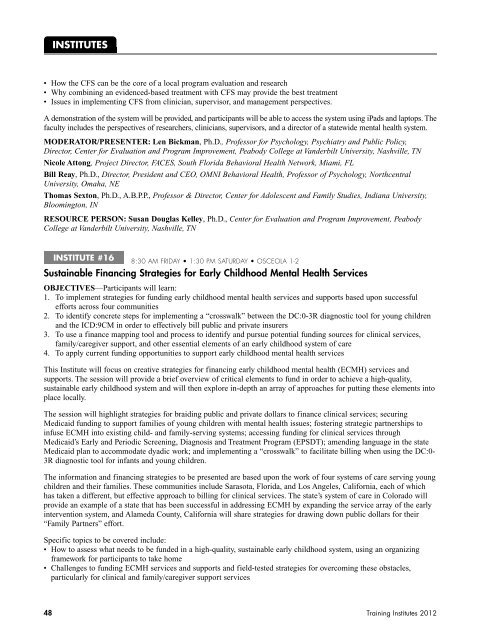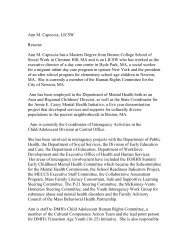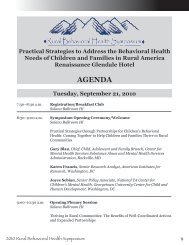Training Institutes 2012 - National Technical Assistance Center for ...
Training Institutes 2012 - National Technical Assistance Center for ...
Training Institutes 2012 - National Technical Assistance Center for ...
You also want an ePaper? Increase the reach of your titles
YUMPU automatically turns print PDFs into web optimized ePapers that Google loves.
INSTITUTES<br />
• How the CFS can be the core of a local program evaluation and research<br />
• Why combining an evidenced-based treatment with CFS may provide the best treatment<br />
• Issues in implementing CFS from clinician, supervisor, and management perspectives.<br />
A demonstration of the system will be provided, and participants will be able to access the system using iPads and laptops. The<br />
faculty includes the perspectives of researchers, clinicians, supervisors, and a director of a statewide mental health system.<br />
MODERATOR/PRESENTER: Len Bickman, Ph.D., Professor <strong>for</strong> Psychology, Psychiatry and Public Policy,<br />
Director, <strong>Center</strong> <strong>for</strong> Evaluation and Program Improvement, Peabody College at Vanderbilt University, Nashville, TN<br />
Nicole Attong, Project Director, FACES, South Florida Behavioral Health Network, Miami, FL<br />
Bill Reay, Ph.D., Director, President and CEO, OMNI Behavioral Health, Professor of Psychology, Northcentral<br />
University, Omaha, NE<br />
Thomas Sexton, Ph.D., A.B.P.P., Professor & Director, <strong>Center</strong> <strong>for</strong> Adolescent and Family Studies, Indiana University,<br />
Bloomington, IN<br />
RESOURCE PERSON: Susan Douglas Kelley, Ph.D., <strong>Center</strong> <strong>for</strong> Evaluation and Program Improvement, Peabody<br />
College at Vanderbilt University, Nashville, TN<br />
INSTITUTE #16 8:30 AM FRIDAY • 1:30 PM SATURDAY • OSCEOLA 1-2<br />
Sustainable Financing Strategies <strong>for</strong> Early Childhood Mental Health Services<br />
OBJECTIVES—Participants will learn:<br />
1. To implement strategies <strong>for</strong> funding early childhood mental health services and supports based upon successful<br />
ef<strong>for</strong>ts across four communities<br />
2. To identify concrete steps <strong>for</strong> implementing a “crosswalk” between the DC:0-3R diagnostic tool <strong>for</strong> young children<br />
and the ICD:9CM in order to effectively bill public and private insurers<br />
3. To use a finance mapping tool and process to identify and pursue potential funding sources <strong>for</strong> clinical services,<br />
family/caregiver support, and other essential elements of an early childhood system of care<br />
4. To apply current funding opportunities to support early childhood mental health services<br />
This Institute will focus on creative strategies <strong>for</strong> financing early childhood mental health (ECMH) services and<br />
supports. The session will provide a brief overview of critical elements to fund in order to achieve a high-quality,<br />
sustainable early childhood system and will then explore in-depth an array of approaches <strong>for</strong> putting these elements into<br />
place locally.<br />
The session will highlight strategies <strong>for</strong> braiding public and private dollars to finance clinical services; securing<br />
Medicaid funding to support families of young children with mental health issues; fostering strategic partnerships to<br />
infuse ECMH into existing child- and family-serving systems; accessing funding <strong>for</strong> clinical services through<br />
Medicaid’s Early and Periodic Screening, Diagnosis and Treatment Program (EPSDT); amending language in the state<br />
Medicaid plan to accommodate dyadic work; and implementing a “crosswalk” to facilitate billing when using the DC:0-<br />
3R diagnostic tool <strong>for</strong> infants and young children.<br />
The in<strong>for</strong>mation and financing strategies to be presented are based upon the work of four systems of care serving young<br />
children and their families. These communities include Sarasota, Florida, and Los Angeles, Cali<strong>for</strong>nia, each of which<br />
has taken a different, but effective approach to billing <strong>for</strong> clinical services. The state’s system of care in Colorado will<br />
provide an example of a state that has been successful in addressing ECMH by expanding the service array of the early<br />
intervention system, and Alameda County, Cali<strong>for</strong>nia will share strategies <strong>for</strong> drawing down public dollars <strong>for</strong> their<br />
“Family Partners” ef<strong>for</strong>t.<br />
Specific topics to be covered include:<br />
• How to assess what needs to be funded in a high-quality, sustainable early childhood system, using an organizing<br />
framework <strong>for</strong> participants to take home<br />
• Challenges to funding ECMH services and supports and field-tested strategies <strong>for</strong> overcoming these obstacles,<br />
particularly <strong>for</strong> clinical and family/caregiver support services<br />
48 <strong>Training</strong> <strong>Institutes</strong> <strong>2012</strong>













